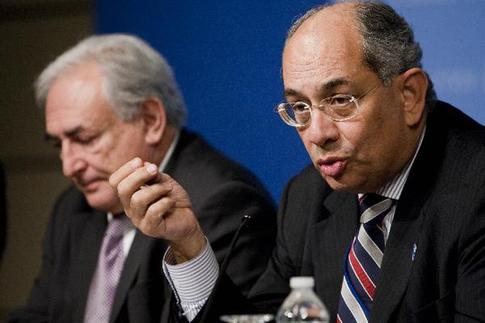Global Biz
IMF calls for country-specific exits from stimulus
(Xinhua)
Updated: 2010-04-25 09:41
 |
Large Medium Small |
SUPPORT TO LOW-INCOME COUNTRIES
The committee welcomed the recovery in many low-income countries, contributing it to their improved microeconomic frameworks, effective policy responses and the support of the international community.
 Egyptian Minister of Finance and Insurance Youssef Boutros Ghali (R) attends a press conference after the International Monetary and Financial Committee (IMFC) meeting in Washington D.C., capital of the United States, April 24, 2010. [Xinhua] |
It welcomed the IMF's recent adoption of a framework for mobilization of loan resources for concessional lending to low- income countries and said the IMF is considering proposals for providing debt relief to countries hit by major disasters such as Haiti.
"2010 will see 65 million people added to the lines of poverty. Eighteen million in Africa ... this was inadmissible and that we should push for additional resources, additional support, within IMF, and within other international organizations," said Ghali.
PLEDGE TO DELIVER ON REFORM
The committee urged members to approve the quota and voice reform package adopted by the IMF in 2008, which aims to increase the representation of developing countries.
"We urge all members to promptly consent to the 2008 quota and voice reform ... we call for an acceleration of the substantial work still needed on the full range of the quota and other governance reforms," the communiqu said.
On April 28, 2008, a large-scale quota and voice reform package was adopted by the IMF Board of Governors, with the aim of making quota more responsive to economic realities by increasing the representation of fast-growing economies and giving low-income countries more say in the IMF's decision-making.
The package called for, among other things, a new quota formula, ad-hoc quota increase to all 54 countries that were under- represented, tripling the number of basic votes to increase the voice of low-income countries, realigning quota and voting shares every five years. For the package to become effective, the approval of 112 member countries representing at least 85 percent of total voting power is required.
According to a report of the IMF's Executive Board to the IMFC, 70 members, representing about 73 percent of voting power have accepted the package to date. Strauss-Kahn said member countries have shown strong political will in pursuing the reforms, a proof of confidence in multilateralism.






